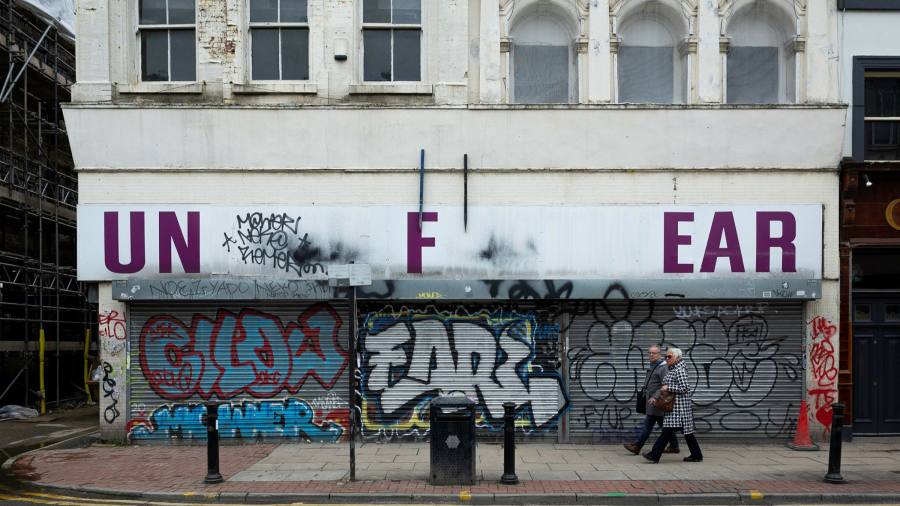The writer is a partner at Sequoia Capital
Deep in the shadow of the Conservative Party there must be a faction that longs for the days when people could walk down the main street and join a queue outside a cinema, wait for a cashier to bank waves them on, pick up some dress patterns at Woolworths, or slip on a pair of headphones at a record store to listen to the B-side of a new 45 by their favorite artist.
Nostalgia, the sight of shuttered storefronts and aggressive lobbying by retailers and supermarket chains are the reasons the UK government is considering levying a new online sales tax – for which he sought comments by May 20.
Downing Street seeks to build skills for the digital age, boost the creation of new tech businesses and make it easier for businesses to manage the fallout from Brexit. An online sales tax would have the opposite effect.
Today, like it or not, every business is a digital business, including those on the high street. Hairdressers, cafés and ice cream parlours, butchers, fishmongers, greengrocers and pharmacies process payments for their non-digital services electronically.
Football clubs sell tickets and shirts online; movies and music are broadcast around the world; architects, advertising agencies and investment banks send business proposals in PDF format; lawyers solicit signatures electronically; yoga teachers lead classes on Zoom. Thousands of small businesses in the UK – potters, cheesemakers, weavers, artists – sell their wares on Shopify or Amazon Marketplace while driving demand on Instagram, TikTok and Facebook, and answering customer questions on WhatsApp.
It’s easy to sympathize with the fate of the family-owned boutique, sitting in the same spot on the local thoroughfare for decades, and now squeezed by the forces of progress. But it’s also easy to forget that this is just the latest disruption to local commerce. A century ago, critics were horrified when the British equivalent of dime and dime stores, where customers could browse freely, replaced tiny stores with goods kept locked behind counters. The rise of department stores, stocking everything from handbags to hammers, also posed problems for small traders. The big box retailers and deep discounters that sprung up on the outskirts of town spelled the death knell for corner hardware stores and grocers, and nearly 30 years ago the template was in place for booksellers when a Seattle small business has launched its website.
A tax on online sales would amount to little more than a subsidy to landlords and stores trapped in long, unprofitable leases. And online retailers, however defined, will almost certainly pass any tax increases on to consumers.
San Francisco, my hometown, provides a sobering example of the impact of tax collection on digital businesses. The city’s tax policies add to the problems plaguing California — high housing costs, long commute times, a slew of new regulations — and have prompted Oracle, Hewlett-Packard and Palantir, among others, to relocate their headquarters. towards more friendly climates.
In 2018, voters in San Francisco approved an initiative sponsored by homeless advocates to impose a special tax on any business with more than $50 million in revenue, with the proceeds earmarked for the homeless. An additional “administrative tax” has been imposed on any San Francisco-based company – many of which are successful tech companies – with more than 1,000 employees, regardless of where they live.
As a result, some of San Francisco’s fastest growing employers, including Airbnb, Block, PayPal and Stripe, headed out. Twitter’s potential new owner, Elon Musk, certainly won’t have time to operate a business in a political atmosphere that seems to demonize success or progress. Some business leaders attribute their decision to abandon the city to changing ways of working caused by the pandemic. But the roots of the leak go back to the 2018 tax change. Meanwhile, the problem of homelessness, despite all the increased spending, has gotten worse.
Instead of trying to reverse history, the Tories might be better advised to reinvent the role of Britain’s high streets. They need look no further than Tottenham, north London, where riots broke out in 2011, to see what the future holds. There, in the orbit of the stunning new football stadium, the main street is gradually finding a new destination. An architectural firm, recording studios and a fashionable training institute occupy or will soon occupy premises that once housed shops.
Embracing tomorrow, rather than pining for yesterday, can be a better compass for the main street and for fiscal policy.

